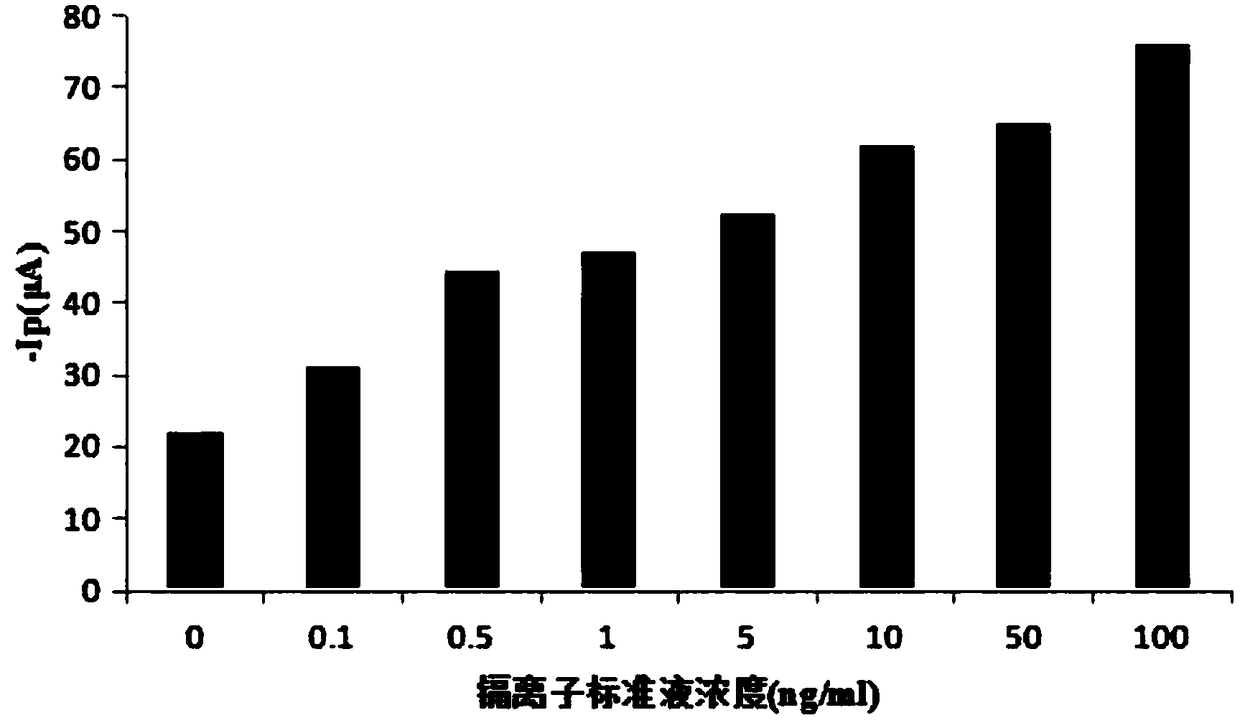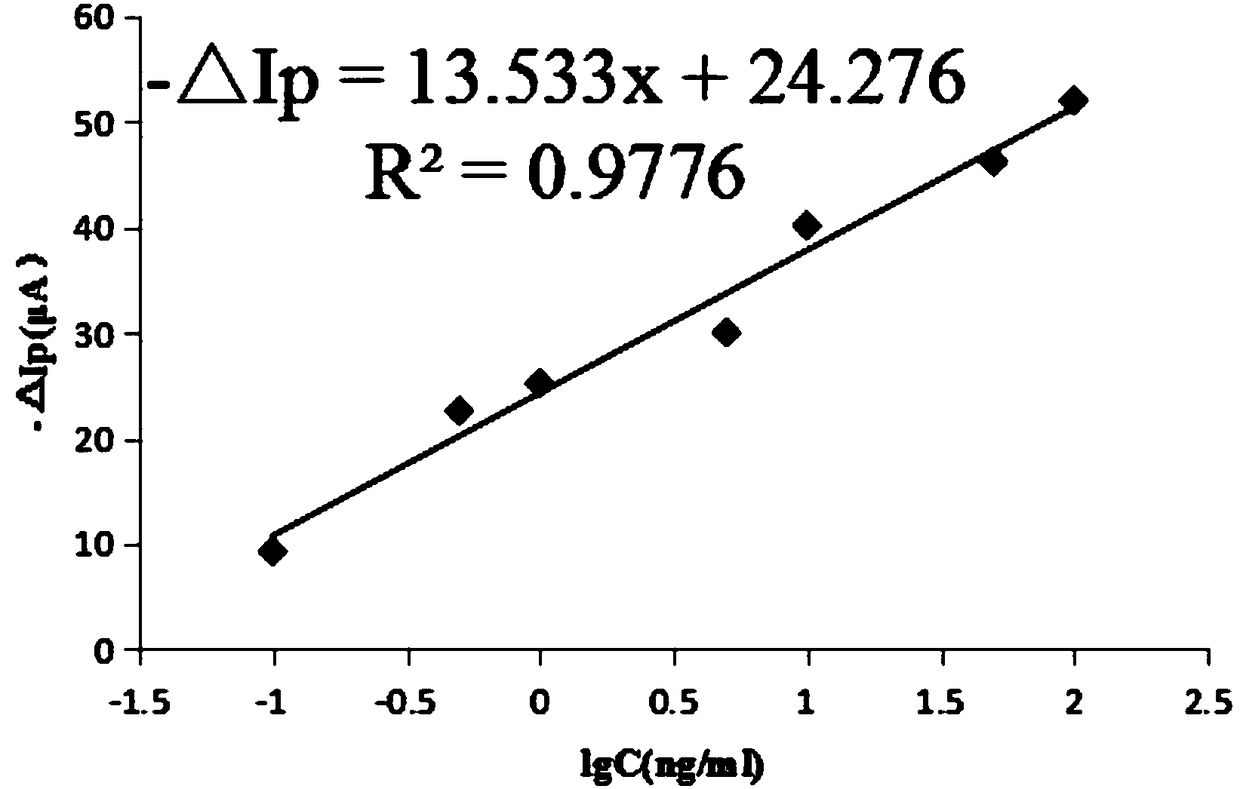Cadmium ion aptamer and screen-printed electrode electrochemical biosensor
A technology of screen printing electrodes and nucleic acid aptamers, applied in the field of detection, can solve the problems of real-time monitoring of food, high detection cost, time-consuming operation, etc., and achieve the effects of fast analysis speed, low detection cost, and easy portability.
- Summary
- Abstract
- Description
- Claims
- Application Information
AI Technical Summary
Problems solved by technology
Method used
Image
Examples
Embodiment 1
[0032] Embodiment 1: Construction of the screen-printed electrode electrochemical biosensor according to the present invention
[0033] (1) Reagents and instruments
[0034] Cadmium nitrate tetrahydrate (Cd(NO 3 ) 2 4H 2 O) Purchased from Sigma with a purity of 99%, the cadmium ion nucleic acid aptamer described in the article was synthesized by Shanghai Bioengineering Co., Ltd. Na 2 HPO 4 12H 2 O, NaH 2 PO 4 2H 2 O, NaCl, KCl, K 4 [Fe(CN) 6 ]·3H 2 O, K 3 [Fe(CN) 6 ], concentrated sulfuric acid, and nitric acid were of analytical grade and purchased from Guangzhou Chemical Reagent Factory. The experimental water was ultrapure water (resistivity: 18.2 MΩ / cm).
[0035] CHI660C electrochemical workstation (Shanghai Chenhua Instrument Co., Ltd.), screen-printed gold electrode (DROPSENS) uses gold as the working electrode (diameter 4mm) and auxiliary electrode, and silver as the reference electrode.
[0036] The sequence of the cadmium ion nucleic acid aptamer is: C...
Embodiment 2
[0045] Example 2: Detection of cadmium ion standard by aptasensor and drawing of its standard curve
[0046] The aptamer screen-printed electrochemical biosensor was rinsed with ultrapure water to remove unbound aptamers. The screen-printed electrodes used gold as the working electrode and auxiliary electrode, and silver as the reference electrode. , K at 5mmol / L 3 [Fe(CN)] 6 , containing 5mmol / L K 3 [Fe(CN)] 6 Differential pulse voltammetry analysis was carried out in the electrolyte, and the DPV diagram of the aptasensor and its peak current value Ipo were recorded. The electrochemical parameters are: working potential 300mV-700mV, scan rate 100mV / s, rest time 2s;
[0047] Incubate the aptamer electrochemical biosensor with a total of 7 cadmium ion standard solutions with concentrations of 0.1, 0.5, 1, 5, 10, 50, and 100 ng / ml in sequence, react at 25°C for 30 minutes, and rinse with ultrapure water after the reaction. Soak for 5min to remove non-specifically adsorbed c...
Embodiment 3
[0049] Embodiment 3: Actual sample detection
[0050] The aptamer sensor described in the present invention is used for actual sample determination and recovery rate detection. In this embodiment, Cestbon purified water is selected as the sample for standard recovery detection, and 1ng / ml, 5ng / ml, 10ng / ml, 50ng / ml cadmium ion standard for DPV analysis, through the standard curve established in Example 2, the concentration of the corresponding example is calculated as the sample concentration of cadmium ion in Yibao purified water. The measurement results are shown in Table 1. The sample recovery rate measured by the electrochemical method is between 85.3%-107.5%, and the average sample recovery rate is 97.9%.
[0051] Table 1: Determination results of cadmium ion content in samples
[0052] Sample serial number
PUM
| Property | Measurement | Unit |
|---|---|---|
| electrical resistivity | aaaaa | aaaaa |
| recovery rate | aaaaa | aaaaa |
Abstract
Description
Claims
Application Information
 Login to View More
Login to View More - R&D Engineer
- R&D Manager
- IP Professional
- Industry Leading Data Capabilities
- Powerful AI technology
- Patent DNA Extraction
Browse by: Latest US Patents, China's latest patents, Technical Efficacy Thesaurus, Application Domain, Technology Topic, Popular Technical Reports.
© 2024 PatSnap. All rights reserved.Legal|Privacy policy|Modern Slavery Act Transparency Statement|Sitemap|About US| Contact US: help@patsnap.com










